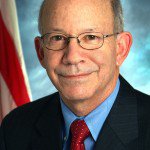Oregon Congressman Peter DeFazio on Nuclear Energy
- June 28, 2010
- Carol Winkel

Q: In the late 1970s and early 1980s you played a significant role in halting the construction of four nuclear power plants that were backed by the Washington Public Power Supply System and strongly subsidized and supported by the Bonneville Power Administration. As you know, Bonneville ratepayers continue to pay hundreds of millions of dollars each year in debt service on two of those unfinished projects, as well as the debt service and operational costs of the one completed plant. Given this history that you know so well, what is your reaction to President Obama's efforts to reinvigorate the nation's commercial nuclear industry with newly designed and inherently safer facilities? Have your views on nuclear energy changed over the years, especially in light of the heightened concerns over climate change and the desire to reduce fossil fuel consumption?
DeFazio: The only resurgence in nuclear power is a political one. Despite more than $150 billion in federal subsidies over the past several decades (30 times more than solar, wind, and other renewable energy sources), nuclear power is still more expensive than other sources of energy and could not compete if only market forces were at work. If not for the massive nuclear loan guarantees passed in 2005, utility companies would not risk the investment in nuclear power. President Obama's expansion of these loan guarantees only digs us deeper in bad energy policy.
The WPPS fiasco taught the Northwest region the true value of nuclear power, but other issues continue to plague this technology. Even in the unlikely event that the Yucca Mountain repository ever accepts nuclear waste, it will be full in a matter of a few years with just the radioactive waste from the currently operating nuclear power plants. And renewable sources of energy such as wind, geothermal, and solar do not result in a dangerous proliferation problem like nuclear power.
Finally, nuclear power is not a very cost-effective way to displace carbon. According to the Rocky Mountain Institute, increasing energy efficiency is seven times more cost-effective than nuclear power when it comes to displacing carbon. For example, it costs approximately $10 billion to build a nuclear power plant. If that $10 billion were instead spent on energy-efficient appliances, insulating older homes and buildings, or fuel-efficient cars, it would cut carbon emissions by seven times the amount that the nuclear power plant would.



